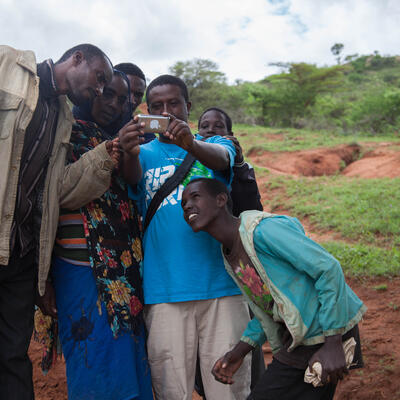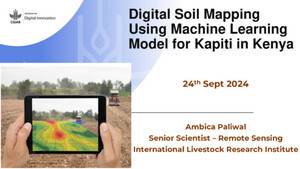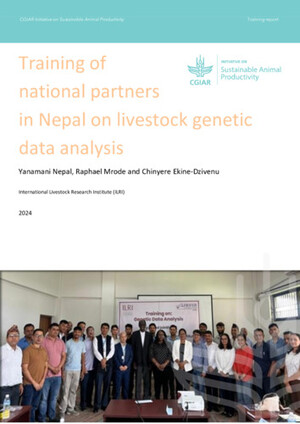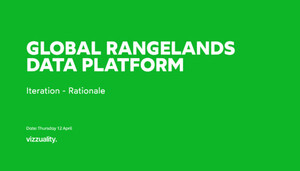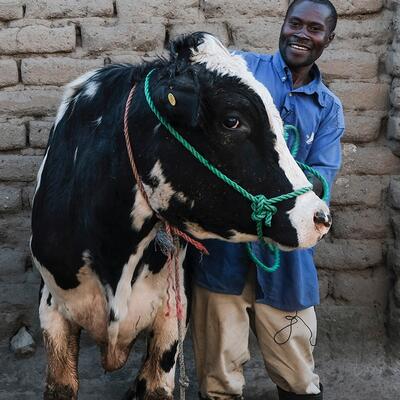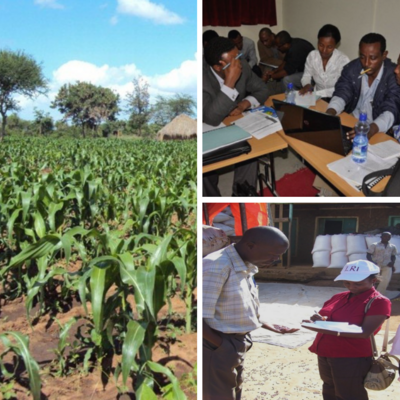
Harnessing the digital connectivity of pastoralists to close data gaps
Pastoralist communities in northern Kenya are among the most neglected people in the country, suffering the highest levels of food insecurity and poverty. This is partly because the nomadic herding of livestock was until recently considered an outdated and unproductive way of life. But equally importantly, a lack of accurate information makes it hard to formulate the policies needed to improve livelihoods and incomes. With droughts becoming increasingly frequent and severe, it is vitally important to tackle the dearth of information.
'Collecting data in the arid regions has always been difficult,' says Maurice Ouma of Kenya’s State Department for Livestock. 'Apart from the obvious issue of poor infrastructure, many people are reluctant to work in areas which experience high levels of insecurity, and where the amenities are poor.'
Furthermore, gathering information by traditional means is expensive. The government’s National Livestock Market Information System required a recurrent budget to pay for two data monitors in each of the 60 markets and provide a platform where data could be collected. 'The project was very reliant on donor support,' says Ouma, 'and when the funds dried up, the project would stop.'
This explains why he and his colleagues were intrigued when they learned about the digital crowdsourcing platform designed by the International Livestock Research Institute (ILRI) to enhance and protect the livelihoods of pastoralists. KAZNET – a play on the Swahili words kazi (work), net (internet) and kaskazini (north) – had its origins in a project where researchers asked pastoralists to use smartphones to collect photos of rangeland conditions.
'We wanted to answer two main questions,' says ILRI scientist Rupsha Banerjee. 'First, could they do it? And second: could they be incentivised with small financial rewards?' The answer was yes. 'This broke the myth that pastoralists couldn’t use mobile phone technology to gather and share data.'
Harnessing pastoralists’ connectivity
KAZNET began in 2017 as a pilot program in six markets within the Isiolo and Marsabit counties. A group of pastoralists were assigned a series of tasks which they could carry out whenever it suited them, though they had to be specific to market days. The contributors collected data on the prices of camels, cattle, goats and sheep; on the volume of livestock; and on the prices of essential commodities such as household goods, milk and staples. The data was recorded on a mobile phone app, which was also used to take photographs of individual animals and the commodities. For each task, contributors were paid a small amount of money.
'We soon realised that we were getting much more reliable data by micro-tasking than organisations using traditional methods of data collection,' says Banerjee. These early findings led to the creation of a Technical Working Group, involving the State Department for Livestock, the University of Nairobi, Kenya Livestock Marketing Council (KLMC) and others with an interest in gathering market data.

One of the great advantages of KAZNET is its flexibility. 'Apart from collecting data about markets, KAZNET proved extremely useful in getting information about COVID-19 when it was difficult to move around the country,' says Maurice Ouma. 'The platform has also gathered data on other issues, and this has been a big plus for everyone.'
KAZNET is embedded in ILRI’s index-based livestock insurance (IBLI) and has used its sentinel zones in northern Kenya to monitor changes in rangeland conditions over time. One of the KAZNET tasks involves contributors taking geo-tagged pictures every 10 metres along a 100 metre transect to assess the availability of forage. At the same time, they gather information about the animals grazing in the area.
'We can combine these findings in the field with data from the markets about livestock body condition,' explains Kelvin Shikuku, IBLI research scientist. 'This acts as a sort of early warning system, indicating when climatic factors are about to threaten pastoralists’ livelihoods.'
How KAZNET data can begin to transform livelihoods
The implementation of KAZNET over an extended period of time not only provides an enhanced understanding of climatic trends, it also yields information about the ways in which drought effects livelihoods. This information is crucial when devising strategies to cope with droughts and other climatic shocks.
Most importantly, KAZNET has proved that micro-tasking, involving members of local communities, can collect accurate data at significantly lower cost than traditional methods. This is not to say that traditional methods no longer have a role to play. The National Livestock Market Information System has recently been revamped and Maurice Ouma believes that both projects have learnt from one another. For example, KAZNET contributors recently began grading livestock, something they didn’t do in the early days of the platform.

Data gathered by KAZNET has helped to increase commercial livestock sales and income, and hastened the enactment of the Isiolo Livestock Saleyard Act, which is improving the efficiency of livestock markets in the county. KAZNET is also providing feedback to pastoralists and their families, helping them, for example, to avoid issues related to poor nutrition. During the 2019 drought, many contributors made decisions about when and where to sell livestock based on data collected by KAZNET.
KAZNET is expanding its operations within northern Kenya under the World Bank-funded Accelerating Impact of CGIAR Climate Research in Africa program (AICCRA) and in southern Ethiopia under the Supporting Pastoralism and Agriculture in Recurrent and Protracted Crises (SPARC) project. The platform is also going to be piloted in agropastoral areas in Taita Taveta, some 380 km south-east of Nairobi.
'Ultimately, the KAZNET app will be capable of collecting different kinds of data relevant for tracking a broad range of indicators, from climate change and migration to conflict over resources,' says Banerjee.
At present, ILRI is the custodian of the app. It is hoped that eventually the app will be taken up by an organisation in the private sector. If and when that happens, it will be real proof of its commercial viability.
Learn more
- Paper: KAZNET: An open-source, micro-tasking platform for remote locations (2022)
- Application: Visit the app on Google Play
- Podcast: Listen to an episode of The Boma podcast on index-based livestock insurance










